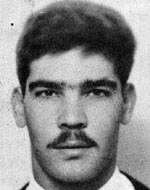Baz (Bozena), Avraham
Son of Yosef and Gabi. He was born on June 25, 1947, in Tunis, Tunisia, and immigrated to Israel in 1955. Abraham came to Israel while he was a child and his education was mostly acquired in Hebrew when the language spoken at home was French. He studied at the elementary school in Acre and later attended a two-year vocational high school, where he belonged to the Scouts movement and later joined Hanoar Haoved, where he worked in a youth club as a folk dance instructor. They studied in Acre in a naval officers’ school, but without the means he could not attend the same school, even though he was still in school In the 8th grade, Avraham made a wooden anchor and glued the pictures of his loved ones to him, and during Purim he used to dress up in the sea. The days when he asked his parents to register him as a member of the Gadna-Yam. Because of his young age, he forced his parents to declare his age as an adult, and finally Avraham was accepted to Gadna-Yam as his request. It was in October 1964. He served as a radio operator and thus fulfilled his ambition to be a sea man, like his friends who were about to finish the academy for officers in Acre. During his service, his main hobbies were the building of ships and submarines, according to the paintings he found in the pamphlets of “Sea Systems”. In the course of his duties, he used to listen to the calls of S.O.S that were heard from ships in distress – and thanks to his alertness, reinforcements would arrive and rescue operations were carried out. In January 1967, Avraham moved to England, and when he returned to Israel, at the end of the course, he said that he had been tested for diving; In May 1967 he was ordained as a diver. It was natural for him not to be away from his home for more than a few days, but at the time of the May 1967 alert his absences began to continue. During the Six-Day War he served in the “Crocodile” which operated near the enemy’s shore and when he appeared in the house after the war his face was very pale. Only a month later he told his younger brother that he had been in the “crocodile” and described his feelings in it in difficult and dangerous times. Before the war, his mother had given him a small book of Psalms to hold in his pocket so that he could turn to him in times of need, and although Abraham would not have believed, he did so for his mother. In one of his conversations with his mother, who was very concerned about the dangers of his service, Avraham replied: “Mother, if you speak of dangers, you know that the easiest death is in a submarine, because it passes through so quickly.” Abraham loved the submarine, which he would always call “my toy” in his letters. For the second and last time that Abraham was in England, he flew to Paris to visit his relatives, who had not seen him for twelve years, and they were glad to meet him and were proud of him, but when the submarine Dakar was on her way home on the sea route between Gibraltar and Israel, the connection was cut off. This was on the 24th of Tevet 5728 (25.1.1968). The Chief Military Rabbinate determined that the date of Avraham’s passing, in the course of his duties together with the rest, was 30 January 1968. Since Avraham was among the missing members of the team, a memorial monument was placed inside him in the memorial to the Dakar people in the military cemetery on Mount Herzl in Jerusalem. In Eran Shorer’s book “Six Days in Decker” his name was commemorated and remembered by bringing his picture. On the 28th of June 1999, after years of searching, the INS Dakar submarine was found on the bottom of the Mediterranean Sea, at a depth of 2,900 meters on its planned sailing route and 250 miles from the port of Haifa. A space whose burial place is unknown.
